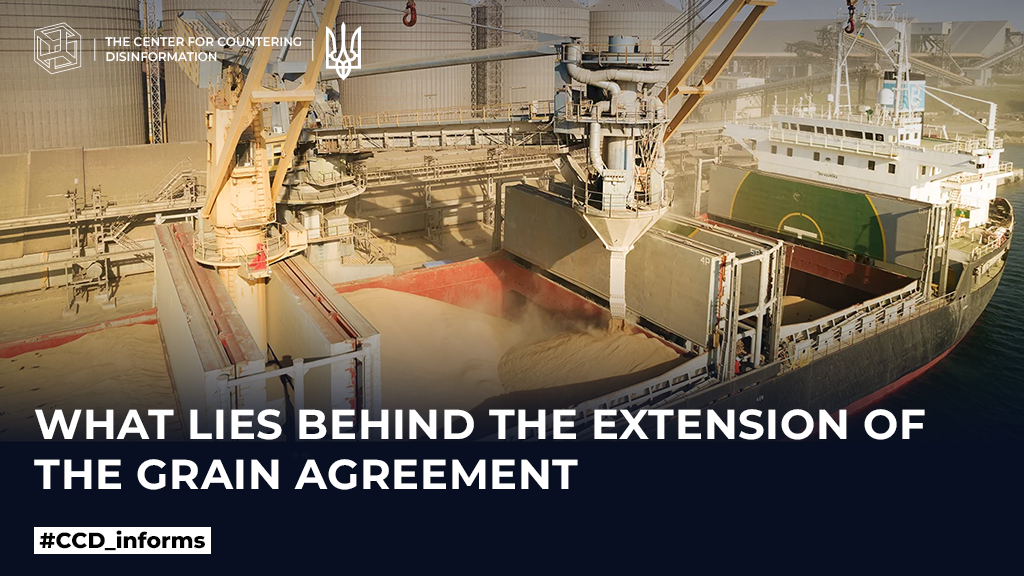Ukraine, Turkey, the United Nations, and Russia have agreed to extend the so-called Black Sea Grain Corridor agreement until July 18. This agreement allows Ukraine to export crops from three key ports (Black Sea, Odessa, and Southern). Additionally, Turkish vessels, as part of the grain export agreement, will be able to enter the ports of Mykolaiv and Olvia in the Mykolaiv region.
The reaction to the event was anticipated. UN Secretary-General A. Guterres referred to the extension of the agreement as “important for global food security.” Turkish President R. Erdogan thanked “Russian friends” for the agreement. On the other hand, the Russian Ministry of Foreign Affairs confirmed that the agreement’s extension had been achieved. However, the majority of average Russians perceived the extension of the grain agreement as a sign of “Russia’s weakness” and personally criticized Putin, expressing their desire to prohibit it on social media. Ukraine welcomed the extension of the agreement, emphasizing the need for Russia to fulfill it, referring to the obstruction and delays caused by Russia in inspections.
❗️ The agreement, known as the Black Sea Grain Initiative, stroke a deal in Istanbul in July 2022 and has been extended several times since then. There are two parallel agreements, one being coordinated between Ukraine, the UN, and Turkey, and the other between Russia, the UN, and Turkey. Over 28.3 million tons of grain and other products have been shipped under the agreement.
Why did Russia decide to extend the agreement amid Ukraine’s accusations of using the Black Sea in attacks on military facilities in the Crimea? There are both economic and political aspects.
First, despite the Kremlin’s public criticism of the grain deal as unprofitable and periodic blackmail of the world by its disruption, in fact, the export of Russian wheat in January-February 2023 almost doubled compared to the same period last year. At the same time, the port blockade allowed Russia to intercept traditional markets for Ukrainian agricultural products. Additionally, halting the implementation of the Black Sea Grain Initiative would reduce the volume of Russian grain deliveries to China, which could jeopardize the established bilateral relations.
Secondly, the extension of the agreement is a result of Kremlin’s political manipulation to overcome international isolation. Despite Erdogan’s controversial reaction to Russia’s invasion of Ukraine, which strained his friendship with Putin, the absence of alternatives forces the Kremlin to rely on him again. On the one hand, Erdogan blocked Russian military ships’ access to the Black Sea and allowed the supply of drones to Kyiv. On the other hand, Turkey became the main source of supplying Russia with sanctioned goods used for military purposes. Erdogan himself purchased the Russian S-400 missile defense system, which undermined NATO’s defense capabilities. This contradictory stance by Erdogan ahead of the presidential elections forces the Kremlin to consider all possible outcomes. It is not a coincidence that Russia chose the end date of the agreement just two days before the presidential elections. If Erdogan were to lose in the first round of the elections to the pro-Western candidate K. Kilicdaroglu, the fate of the agreement would depend on the new president’s position regarding the war in Ukraine, and the Kremlin would decide whether to stop or restart the grain corridor accordingly. In the face of uncertainty regarding the results of the second round of the presidential elections, the Kremlin calculated it would be more advantageous if Erdogan remained in power. Extending the agreement would increase his chances of victory since the Turkish electorate positions the current president as the “architect” of the grain agreement.
It can be predicted that in exchange for support in case of victory, Putin will demand certain concessions from Erdogan, including the refusal (or reduction) of drone deliveries to Ukraine, assistance in restoring the operation of the Tolyatti-Odesa ammonia pipeline, lifting the ban on importing foreign agricultural machinery and spare parts to Russia, removing barriers to the export of agricultural products and fertilizers. Additionally, Erdogan will be able to guarantee the continuation of re-exporting sanctioned goods through Turkey, as is currently happening, which helps Russia close the most critical gaps in its industry and consumer market.
From a military perspective, the grain agreement became a “response” to the United Kingdom’s offer to guarantee the security of the corridor in the Black Sea with its own military ships. Therefore, the continuous extension of the grain agreement allows for the presence of “safe” Turkish ships in the Black Sea instead of British ones.
❗️Thus, the extension of the Black Sea grain initiative will preserve the route for Ukrainian grain shipments through the Black Sea and increase food supplies to the poorest countries. However, the threat to these shipments has only been postponed for two months, and the long-term fulfillment of Russia’s commitments under the agreement remains highly uncertain.










